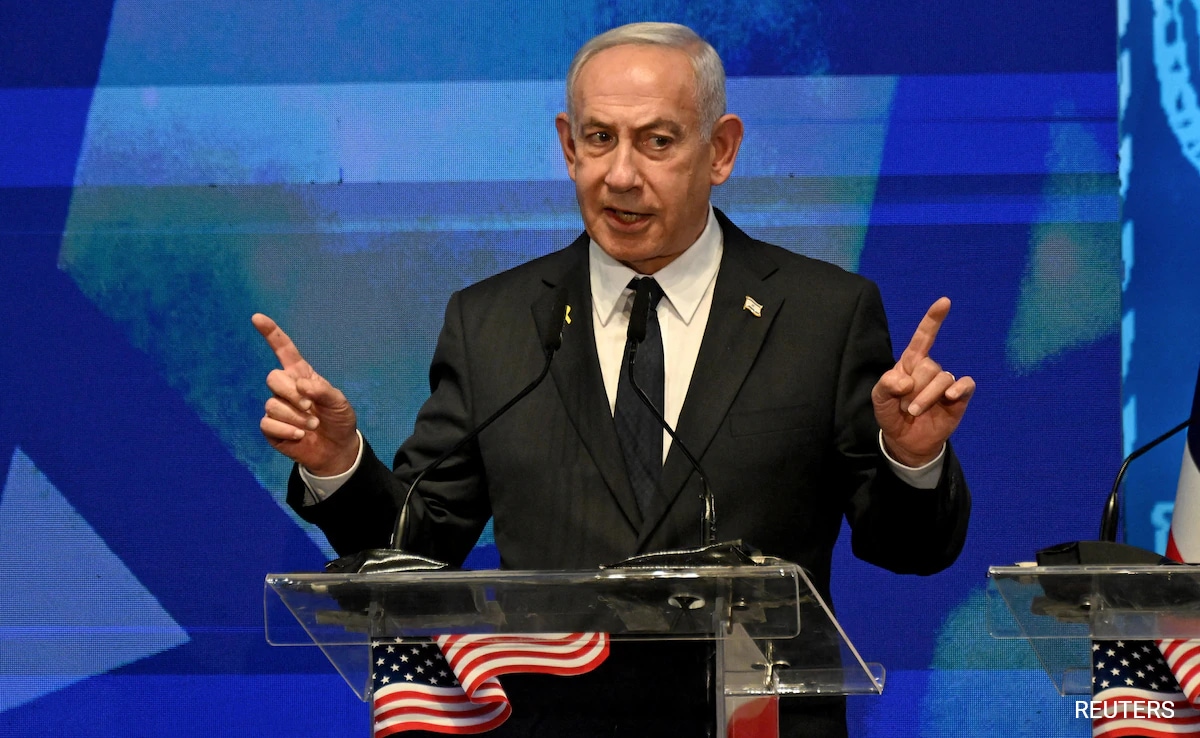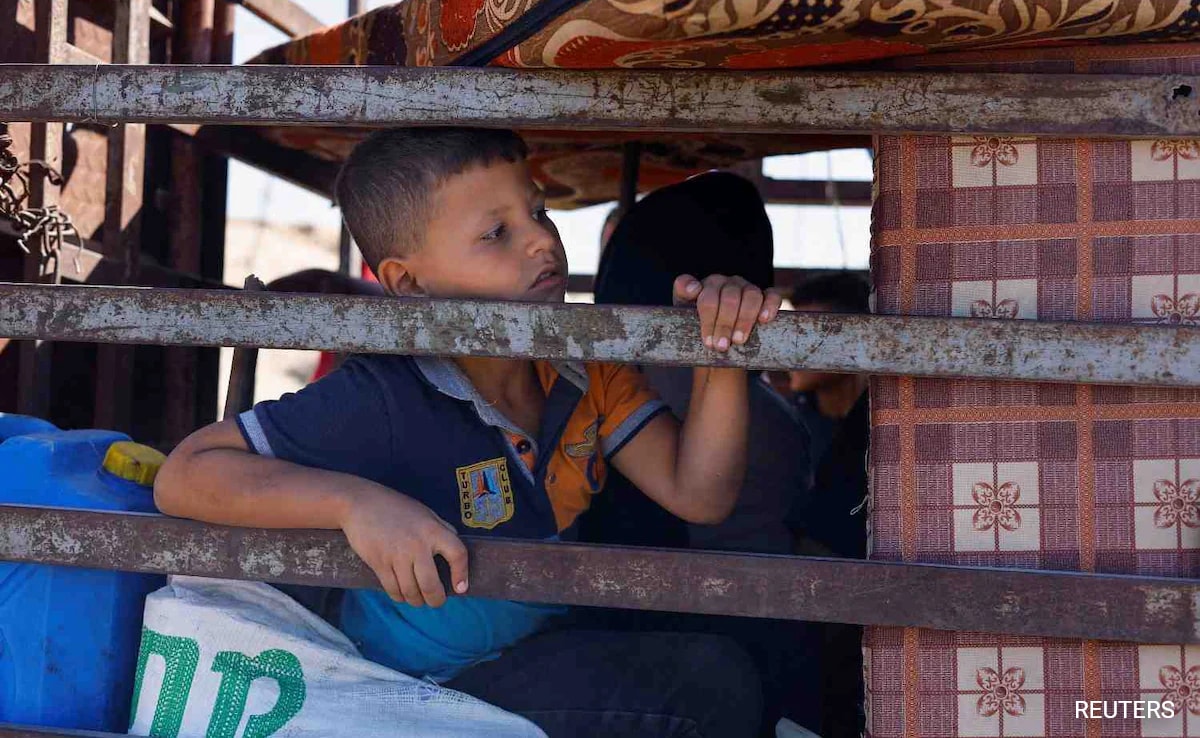President Biden arrived in Rzeszow, Poland, a city 60 miles from the Ukrainian border, for a humanitarian briefing and to visit with U.S. troops stationed there.
The visit, another show of Washington’s solidarity with its transatlantic allies, follows a U.S. pledge to accept 100,000 Ukrainian refugees and a vow to respond “in kind” if Russia uses chemical weapons.
The battle for the Ukrainian capital, Kyiv, rages on as the war enters its second month, with counterattacks forcing Russian troops into defensive positions, according to U.S.-based military analysts.
While addressing the European Council and the nations of Europe on Thursday, Ukrainian President Volodymyr Zelensky said he was “grateful” for sanctions against Russia, but that they came “a little too late.” He urged them to expedite Ukraine’s application to join the European Union, saying: “Here I ask you — do not be late. Please.”
Here’s what to know
New video shows aftermath of Mariupol theater bombing
Return to menuTwo new videos, posted to Telegram and verified by The Washington Post, show the Mariupol Drama Theater after it was hit by a Russian airstrike. More than 1,000 people were sheltering inside the theater when it was hit March 16.
The first video shows many people covered in dust at the base of a staircase, with more people coming from the level above. Debris is scattered on the steps. The second video shows the theater’s auditorium reduced to rubble, the space now almost unrecognizable except for some patterning on a wall.
“There may be a lot of people under the rubble,” says the man filming.
Biden lands in Poland, will meet with U.S. troops before heading to Warsaw
Return to menuRZESZOW, Poland — President Biden landed here Friday, a city about 60 miles from the Ukraine border, for what will be his starkest confrontation yet with the intensifying refugee crisis as millions of Ukrainians flee amid Russia’s ongoing invasion.
Biden will receive a briefing on the humanitarian response to address the suffering of civilians inside Ukraine and respond to the growing flow of refugees leaving the country.
The president will then meet with U.S. service members from the 82nd Airborne Division, who are working alongside Polish allies on deterrence efforts on NATO’s eastern flank. The United States has 10,500 troops in Poland, Jake Sullivan, Biden’s national security adviser, told reporters Friday aboard Air Force One.
Biden will then fly to Warsaw ahead of a bilateral meeting with President Andrzej Duda on Saturday, where Biden will thank the Polish leader for his country’s efforts to assist Ukraine and further coordinate the humanitarian response. Biden will also meet with Ukrainian refugees and then deliver an address.
The Poland visit, which was finalized only days ago, follows Biden’s meetings in Brussels on Thursday, where he attended a trio of summits with NATO, the Group of Seven and European Union allies. The Western allies announced new sanctions on Moscow and issued a stern warning to Russian President Vladimir Putin not to use chemical, biological or nuclear weapons in Ukraine.
Pager reported from Warsaw.
U.K. announces sanctions against Russian government hacking group
Return to menuBritish Foreign Secretary Liz Truss accused a Russian government hacking group Thursday of targeting critical infrastructure and information systems in Europe, the Americas and Asia, saying officials were “almost certain” that Russia’s Federal Security Service was behind the attacks.
Truss also announced sanctions against a section of the Russian Defense Ministry for what she and U.S. prosecutors say was a cyberattack against a Saudi Arabian petrochemical plant in 2017.
“Russia’s targeting of critical national infrastructure is calculated and dangerous. It shows [Russian President Vladimir] Putin is prepared to risk lives to sow division and confusion among allies,” Truss said in a statement.
“We are sending a clear message to the Kremlin by sanctioning those who target people, businesses and infrastructure. We will not tolerate it.”
Earlier Thursday, the U.S. Justice Department announced indictments against four Russian government employees for an alleged years-long hacking campaign targeting the energy sector in 135 countries. The indictments underscored concerns among U.S. and European officials that the Kremlin will use a wave of cyberattacks to retaliate against the West for the sanctions imposed over the Russian invasion of Ukraine.
Since Russia does not extradite its citizens to the United States, it is unlikely that the four will face trial.
Devlin Barrett contributed to this report.
Stock futures point to rally, despite cloud of global tensions
Return to menuWall Street’s rosy mood continued Friday, with stocks on track to notch their second straight week of gains, even as investors remained lasered in on the war in Ukraine and surging U.S. inflation.
The Dow was poised to pop 100 points, or nearly 0.4 percent, at the open. The S&P 500 was also projected to edge 0.4 percent higher, while the tech-heavy Nasdaq was slated to gain 0.5 percent.
Stocks, which sold off sharply after the Russian invasion as the United States and its allies rushed to sanction Moscow, have recovered ground. As one of the world’s energy producers, Russia can sow major disruption in energy markets. Oil prices spiked after the invasion and remain elevated, causing pain at the gas pump as consumers and businesses already are grappling with soaring inflation.
Earlier this week, the Federal Reserve signaled that it might take an even tougher path in reining in inflation, after having already signaled a series of increases to its benchmark rate for the rest of 2022. Investors are typically wary of rate increases, as they limit the amount of money in the economy and can hit highflying companies especially hard. But as the economy tries to shake off the highest inflation in 40 years in tandem with the war in Ukraine, investors seem to welcome the intervention from the central bank.
“The upward momentum continues even with no concrete progress toward a cease-fire between Russia and Ukraine and an increasingly more aggressive Fed,” Ivan Feinseth, chief investment officer at Tigress Financial Partners, said Friday in comments emailed to The Post.
Oil prices drifted lower Friday but remained above $110 per barrel. Prices have been under severe pressure since the invasion but have eased as optimism about cease-fire talks has grown. The national U.S. average for a gallon of gas was $4.24 Friday, up 67 cents from a month ago.
Russia brushes off threats to expel it from G-20
Return to menuRussia brushed off threats by the United States and others Friday to expel the country from the Group of 20 club of the world’s largest economies, saying that leaving would not be a “death sentence.”
Kremlin spokesman Dmitry Peskov told reporters that although the G-20 is significant, Moscow could live without it.
“As concerns the G-20 format, it is important, but on the other hand in the current conditions, when most of the participants in this format are in a state of economic war with us at their own initiative, it is not a death sentence,” Peskov said in response to a question about calls for Moscow to be expelled.
“In any case, Russia bears in mind the opinions of the other participants in this format and will stand ready to take part, if this is possible,” he said. “If this is not possible, then, as we say, nothing deadly harmful will happen.”
Peskov also said it would be important for Russia to “build new avenues of relations in all areas,” as a result of what he called breaches of international law. He was apparently referring to China, which called Russia an “important member” of the G-20 earlier this week. Chinese Foreign Ministry spokesman Wang Wenbin told reporters: “No member has the right to remove another country as a member.”
President Biden, speaking at a news conference at NATO headquarters in Belgium on Thursday, voiced support for removing Russia from the G-20 as a consequence of its ongoing invasion of Ukraine. However, he said the decision would ultimately be up to the nations of the G-20.
Russia’s ambassador to Indonesia, where the G-20 meeting will be held in October, told reporters Wednesday that President Vladimir Putin still plans to attend the summit.
Russia’s economy is being bruised by sweeping economic sanctions and the withdrawal of hundreds of international corporations, which have severed financial ties with the country in a bid to isolate it over its invasion of Ukraine.
Russian membership in the Group of Eight, a smaller organization of leading industrialized nations, was suspended after Putin’s annexation of Crimea in 2014.
China’s Xi, Britain’s Johnson discuss Ukraine in call
Return to menuSHANGHAI — Chinese President Xi Jinping held a call with British Prime Minister Boris Johnson on Friday in which they discussed the Ukraine war.
On the call, Xi reiterated that China is willing to “continue to play a constructive role” in encouraging peace, promoting talks and creating conditions for a political settlement in Ukraine, according to a readout from China’s Foreign Ministry.
The call came a day after NATO leaders, including Johnson, issued a joint statement calling on China to condemn Russia and warned the country against offering support for President Vladimir Putin’s war. Beijing has declined to condemn Russia. Instead, it has said that other countries should acknowledge the legitimate security concerns of both Ukraine and Russia to help bring about a peace settlement.
The Chinese readout was brief and did not specify what Johnson said to Xi about Ukraine on the call, other than that Britain was open to “candid dialogue” and coordination on “regional hot-spot issues.” It also did not mention Russia.
Xi told Johnson that Beijing hoped Britain would view China “in an objective and fair manner, and work with the Chinese side to promote the continuous development of bilateral relations,” the readout said.
Also on Friday, Chinese Foreign Minister Wang Yi met senior officials in India, in the first visit by a senior Chinese official since border clashes between the two countries two years ago. The China-India meeting has drawn concerns in the West, as the two countries have both declined to join Western sanctions on Russia.
Mariupol city council condemns ‘inhuman cruelty’ of theater strike
Return to menuMUKACHEVO, Ukraine — The Mariupol city council has condemned the “inhuman cruelty” of a Russian airstrike on a theater in Mariupol earlier this month, adding that “there will never be forgiveness for those who brought devastation, pain and suffering to our home.”
The council’s statement, posted Friday in an update on Telegram, said that based on eyewitness accounts, it appeared that about 300 people died in the attack. It did not provide further details on how the council had arrived at the figure. However, a Mariupol news site published an interview Thursday with two eyewitnesses who survived the blast, including one who estimated that at least 300 people were killed. The Washington Post could not independently verify the figure.
News site “0629” quoted one eyewitness, identified only as Natalya, as saying: “I think that during the strike itself, about 100 people died — all those who were near the field kitchen and were waiting for their boiling water, volunteers. And the rest — in the right wing of the building — died under the rubble, because there was no one to pull them out. I think it’s about 200 more people, maybe more.”
Little independent reporting is available from the besieged city, making claims difficult to verify. Some previous death tolls reported by Ukrainian officials later turned out to be incorrect.
Ukraine’s stately Mariupol Drama Theater was reduced to rubble on March 16. Ukrainian officials say it was devastated by a Russian airstrike and that hundreds of civilians had been sheltering in a basement bunker. The Russian Defense Ministry denied involvement, saying its forces “did not carry out any tasks related to strikes against ground targets in the city of Mariupol.” It claimed, without evidence, that Ukraine’s far-right Azov Battalion, a paramilitary group, was responsible for the incident.
There have been conflicting reports about how many people were inside the theater when it was bombed. An adviser to the Mariupol mayor’s office, Petro Andryushchenko, told The Post earlier this month that at least 130 people had been rescued from the bombed theater and that roughly 800 to 1,000 people were believed to have been in the building at the time of the attack.
Human Rights Watch said between 500 and 800 civilians were sheltering in the theater before it was bombed, citing interviews with residents fleeing Mariupol this month.
Mariupol, a strategic southern port city on the Sea of Azov, has borne the brunt of the Russian offensive so far and faced intense attacks. It has been cut off from the outside world for weeks. Food, water and electricity shortages have been reported amid an almost total blackout of communications, making independent reporting extremely difficult.
The theater strike is one of several attacks in Mariupol on civilian targets. A maternity hospital was previously destroyed by Russian bombing.
Suliman reported from London. Annabelle Chapman contributed to this report.
Russia hacked satellite communication devices in Ukraine, U.S. says
Return to menuU.S. intelligence analysts have concluded that Russian military spy hackers were behind a cyberattack on a satellite broadband service that disrupted Ukraine’s military communications at the start of the war last month, according to U.S. officials familiar with the matter.
The U.S. government, however, has not announced its conclusion publicly.
“We do not have an attribution to share at this time and are looking at this closely,” said Saloni Sharma, a spokeswoman for the National Security Council. “As we have already said, we are concerned about the apparent use of cyber operations to disrupt communications systems in Ukraine and across Europe and affect businesses and individuals’ access to the Internet.”
Europe rejects Putin’s ruble request for oil, denounces ‘blackmail’
Return to menuEuropean leaders this week rejected as “blackmail” a request by Russia to seek payment in its own currency, the ruble, for shipments of its oil and gas.
“We will not allow our sanctions to be circumvented. The time when energy could be used to blackmail us is over,” European Commission President Ursula von der Leyen told reporters on Thursday following high-level summits in Brussels.
Earlier this week, Moscow stunned financial markets when President Vladimir Putin announced that “unfriendly countries” — including all European Union members and the United States — would have to pay for their natural gas supplies in rubles.
“It makes no sense whatsoever,” Putin told Russian officials, “to supply our goods to the European Union, the United States and receive payment in dollars, euros and a number of other currencies.” He did not outline when the new policy would take effect.
Von der Leyen warned that seeking payment in rubles would be a “unilateral decision and a clear breach of contract” on Russia’s part.
On Friday, the United States and the European Commission announced a joint task force to reduce Europe’s reliance on Russian fossil fuels, as the West looks to further punish Russia for its invasion of Ukraine. Under the partnership, the United States would seek to increase liquefied natural gas exports to Europe by at least 15 billion cubi
.png)











 English (United States) ·
English (United States) ·  Turkish (Turkey) ·
Turkish (Turkey) ·